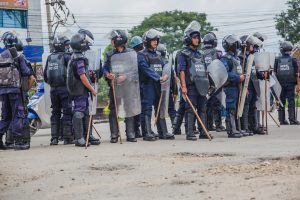On September 8, Nepal witnessed a reckoning. Protests spread like wildfire through seven cities: Kathmandu, Pokhara, Dharan, Butwal, Chitwan, Jhapa, Itahari, and beyond. Thousands of young people poured into the streets – not to oppose the sudden social media ban, as has been reported by many news agencies, but to speak out against something far deeper: the steady erosion of their freedoms and dignity.
Many of those who marched came in their school or college uniforms. Some carried books and flags, others held up hand-painted placards that read: “Shut down corruption and not social media.” It began as a peaceful demonstration in Kathmandu, one that was formally approved by the Kathmandu District Administration Office.
But the response was brutal. Tear gas choked the streets. Water cannons scattered crowds. Rubber bullets and even live ammunition were unleashed on unarmed students. By nightfall, bodies lay on the pavement. At least 17 young Nepalis are dead. Dozens more are wounded. The numbers are still climbing.
This protest matters because it is not a fringe movement. It is a youth-led awakening. Nepal’s Gen Z, the most digitally connected generation the country has ever known, is staking its claim to a future rooted in transparency, civic freedom, and fairness. The breadth of participation across the country makes it clear: this is not mere unrest. It is a national demand for reform.
At its heart, the movement is about digital rights, which in today’s world are inseparable from civil rights. The government’s decision to ban 26 social media platforms – including Facebook, WhatsApp, and Reddit – was not an administrative detail. It was a direct assault on how Nepalis learn, communicate, and earn a living. Nearly 90 percent of Nepal’s 30 million population relies on these services. Nepal’s government suddenly cut these platforms off and then fired at those who dared to resist.
Trust between the government and its people has now been shattered, and lives have been lost. The sight of unarmed students gathered in hope and unity but being met with bullets is indefensible. A government that shoots at its future cannot expect to lead it.
What the government must do now is simple. First, the violence needs to stop. Tear gas, bullets, and curfews are not tools of governance in a democracy. Protest is not a crime; it is a right. The youth must be allowed to raise their voices without fear.
The government should then open the doors to dialogue. Parliament must revisit its legislation and policies – not behind closed doors but with civil society, student groups, and young leaders present at the table. Laws that govern expression cannot be written without the input of those whose voices they affect most.
And finally, the government needs to commit to real accountability. The deaths and injuries of these past days cannot be swept under the rug. Independent investigations are needed. Those responsible for unlawful use of force must face consequences. Only when the government acknowledges its mistakes and seeks justice can trust begin to be rebuilt.
Nepal now stands at a crossroads. What unfolded this week was not born out of anger alone. It was born out of hope that Nepal can be more transparent, more just, and more inclusive. When young people rise together in city after city it is both a warning and an opportunity.
The government must choose dialogue over bullets, listening over silencing, justice over impunity. The future of Nepal depends on it.
































